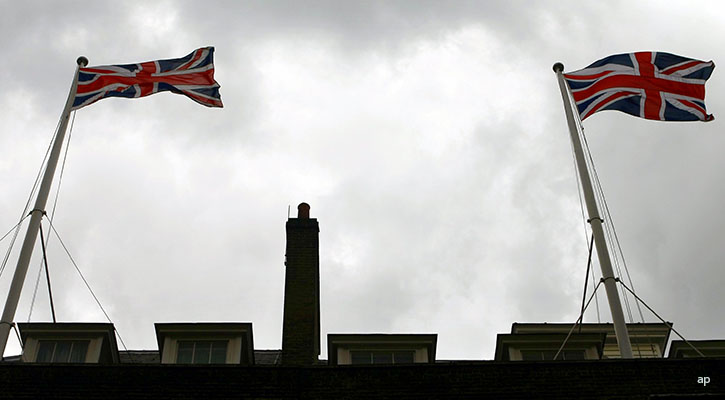
UK stock markets have so far reacted positively so news of the latest political turmoil that has seen two high profile cabinet figures quit, including the chancellor Rishi Sunak.
The resignations of both Britain’s finance minister and the health secretary Sajid Javid came after market close on Tuesday, so Wednesday’s opening trading gives investors a first indication of market sentiment. The FTSE 100 was up nearly 1.5% by 100 points to 7,124, while the more domestically focused FTSE 250 gained 1% or 223 points to 18,539. A common benchmark for investment funds, the FTSE All Share, was up by a similar percentage to 3,917 points. Certainly, professional investors are sanguine about the unfolding saga.
These gains can be interpreted in a number of ways: the markets anticipating a change of leadership in the Conservative party, or a broader relief rally after a bruising few days for European stock markets. Currency moves are also a factor as sterling continues to come under pressure – the pound had already started to fall from $1.21 to $1.20 before the news of the resignations started to break, but this comes in a strong period for the dollar, which hit a 20-year high against the euro this week. The pound gained against the euro this morning to €1.17 but that comes in the context of a squeeze on the eurozone currency. Generally, though, these market moves are not particularly marked given the political crisis that prime minister Boris Johnson faces. Or perhaps markets have “seen the writing on the wall” after the partygate scandal from which the Tory leader was lucky to escape in post. Sometimes markets and politics are disconnected from each other, except in very extreme cases like the aftermath of the Brexit vote in 2016.
Rishi Sunak’s resignation was the second to be announced but it was the most significant for savers and investors. Sunak hands over to education secretary Nadhim Zahawi, a founder of listed polling company YouGov (YOU). The former chancellor had been under pressure for months anyway because of disquiet over his wife’s business interests (the couple appeared on the Sunday Times Rich List this year) and tax status. Sunak was head of the UK Treasury from 2020 to 2022 and will be remembered for presiding over the furlough scheme during the pandemic and the ill-fated “eat out to help out” policy. His final fiscal act as chancellor was to impose a windfall tax on UK oil and gas companies, introduce a one-off payment to low-income families and a £400 rebate on energy bills for all households. This came after the spring statement in March 2022.
“The outgoing Chancellor has highlighted differences in opinion on fiscal policy as being a key reason behind his resignation. Expectations are that the new chancellor will lean towards more fiscal generosity than his predecessor has been recently. He faces formidable challenges,” says Paul O’Connor, head of multi asset at Janus Henderson.
“The new chancellor is not going to be in a position to substantially alter the course of the UK economy. This probably explains why sterling and other UK assets have barely moved on the news of these resignations and appointments. The best he can hope for is to help steady the ship, until the global economic storm has passed. Some targeted fiscal measures seem more likely than an attempt at introducing a transformative new policy regime.”
Sunak's Legacy in Links:
1) Here's our coverage of the March 2020 Budget
2) July 2020 'summer statement'
3) Autumn 2021 Budget analysed
4) March 2022 spring statement - summary
5) Windfall tax introduced - May 2022
Furlough, Then Fumbles
Aside from the Treasury’s largesse during the pandemic panic, the Sunak era will also be remembered for some fiscal muddle, mixed messaging and U-turns: a one-off “loan” for energy customers was scrapped in favour of a more simple rebate. Plus a rise in national insurance contributions in April this year was tempered on July 6 with a rise in the threshold before NICs are paid – most households will be better off under the latest changes but higher earners are still likely to pay more tax.
A cut in the basic rate of income tax from 20% to 19%, announced in the spring statement, will take effect in 2024. The tax burden is now the highest since World War II but the Conservatives are still clinging on to the narrative they are the party of low taxes. And tax cuts seem to be the only weapon to tack the current cost of living crisis, especially given the Bank of England’s monetary tightening, which is making credit more expensive for households and businesses. This weekend saw reports of a potential VAT cut, from 20% to 17.5%, reversing the move made by George Osborne as chancellor in January 2011.









.jpg)


















